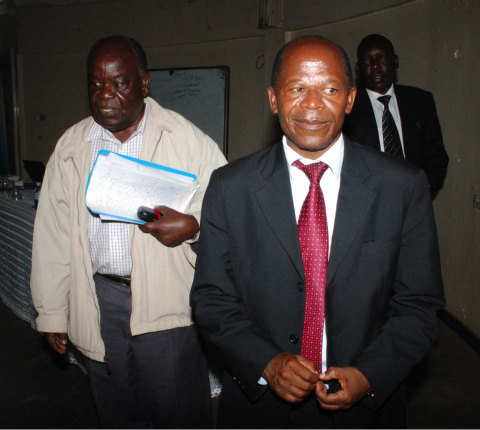Student Loan Scheme not discriminatory- Muyingo
Submitted by fkakooza on

The state minister for Education, Chrysostom Muyingo has refuted all allegations that the students’ loan scheme is discriminatory.
Speaking to students at the Makerere University Law Auditorium on Thursday 11th, Muyingo said that he has received complaints from parliament and the general public about the scheme discriminating against regions, gender, the disabled and Arts students; all which he said is not true.
“People were complaining to me for ignoring the disabled but they are represented. The loan scheme is open to all,” Muyingo said.
This was during a debate dubbed “analyzing the Higher Education Students Financing Loan Scheme in Uganda: opportunities and challenges” organized by the Makerere law society.
On Monday September 8th, the Higher Education Students Financing Board (HSFB) released a list of 1269 beneficiaries of the students’ loan. All the students were admitted to science courses in the universities of Bugema, Busitema, Gulu, Islamic University of Uganda (IUIU), Kampala International University (KIU) and Kyambogo.
The other universities were Makerere, Mbarara, Ndejje, Nkumba, Uganda Christian University (UCU) and Uganda Martyrs.
A total of 26 science courses have been approved for financing for the 2014 / 2015 academic year.
They include: medicine & surgery, education, pharmacy, agriculture, nursing, agriculture mechanization, dentistry, water resource engineering, medical laboratory sciences, agro-processing engineering, medical laboratory and animal production & management.
Others are clinical medicine & community health, mining, community health, agriculture & entrepreneurship, medical radiography, vocational studies in agriculture with education, veterinary medicine, electrical engineering, nursing completion, civil engineering, pharmaceutical sciences, mechanical engineering, physiotherapy and petroleum engineering.
The HSFB Executive Director, Michael Wanyama said that Arts courses have not been discriminated against because they are initially looking at courses that have human resource gaps.
“We highly recognize that humanities are very essential and in future we shall have a hybrid of both humanities and sciences on a ratio of three to two (3:2).
Reports of Misallocation of Loan funds
Kalungu West Member of Parliament, Joseph Ssewungu who is also chairperson of Parliaments’ Education committee, presented a parliamentary report that alleges misappropriation of loan funds.
According to Ssewungu, out of the 6 billion which was allocated for the loan scheme, only 4.5 billion was dispatched. He alleged that 1.69 billion has been diverted into other Ministry of Education activities.
Muyingo however denied any misappropriation of funds. He said that if any money was diverted, it was to deal with a pressing matter in the education ministry.
Can the loan scheme resolve the crisis in higher education?
Government and State scholarship have been means through which government finances students at higher institutions of learning.
However, there have been public out cries of unfairness in awarding these scholarships because most of the students who win the scholarships are from well to do schools, of which some pay fees equivalent to university tuition.
Wanyama said the loan is meant to cover tuition; functional and research fees; and supportive equipment for persons with Disabilities (PWDs). The monies shall be remitted directly to the universities so as to avoid them from misusing them.
According to the former Executive Director of the National Council for Higher Education (NCHE), A.B Kasozi, the loan scheme should free the hands of government so that it can be able to fund critical areas of education like research.
Kasozi said that loans reduce the amount of money the public spends on students in terms of sponsorship since under this scheme, the students has to pay back the tax payer’s money so that another person can also be a beneficiary.
“This scheme will increase consciousness, reduce waste and the dropout rate will also reduce,” Kasozi said.
Who is eligible?
Article 20 (1) provides that the scheme is only for Ugandan students seeking financial assistance to pursue an accredited course of study in an accredited institution of higher learning recognized by the NCHE.
Wanyama said that the Loan Board looked at indicators such as orphanage, previous school of study which schools were categorized into super, middle and poor, parents’ education, household burden, disability and also how the students paid fees in the previous school, i.e. whether they were perpetual defaulters of not.
“To ensure transparency, we released the list in the print media so that the public can identify those people who were offered loan yet they can afford to pay. It is not that they were all successful, we are still investigating and the public should help us,” Wanyama said.
The national Identity Card according to Wanyama is going to be a must have for anyone who will need to apply for the loan next year.
How to pay back?
Students shall be given a grace period of up to one year after completion and this shall apply whether the person is employed or not.
According to Wanyama, this money shall be recovered on a monthly basis and the amount shall not exceed 30% of the students’ monthly salary.
Wanyama says that students shall be given up to double the years they spent in school to repay the loan. “We also want students to save. So if your course was for two years, you shall have four years within which to pay back the loan,” Wanyama said.
He also said that all the students will be listed on the credit reference bureau, and get a financial card so as to ensure that the person has a good character.
“In case they refuse to pay back, no institution will be able to lend them money because they will not be credit worthy,” Wanyama said.
- Log in to post comments
- 1139 reads
